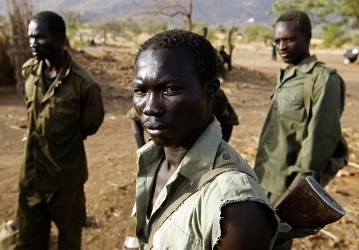SPLM-N denies political talks with Sudanese government
July 26, 2012 (KHARTOUM) – Sudan People’s Liberation Movement- North’s (SPLM-N) Secretary General, Yasir Arman denied holding political talks with the Sudanese government and accused Khartoum of politicising their humanitarian negotiations.

After his arrival to Addis Ababa on Thursday, Arman released two statements, in Arabic and English, to deny what Mutirf said and to explain the position of his group over the announced negotiations.
The rebel official stated they are in Addis Ababa only for consultations with the chief mediator Thabo Mbeki and members of the African Union High Level Implementation Panel (AUHIP). But he ruled out political negotiations with a Sudanese government delegation led by Kamal Obeid.
He went further to disclose that the humanitarian talks, which started two days ago, are stalled because, according to Arman, the government says a political agreement should be sealed before signing a humanitarian deal on the technical arrangements which will allow aid groups to work in the rebel held areas.
“Again, they are openly talking that humanitarian assistance should be subject to political agreement, which in essence they are bringing to the table the policy of mass starvation as a political weapon and for political gains.”
Sudan was refusing to allow humanitarian assistance to reach the civilians in the rebel controlled areas, expressing fears that rebels would benefit from food dedicated to civilians.
However Khartoum and the SPLM-N accepted an initiative by the UN, African Union and Arab League. According to tripartite plan, UN agencies will provide the humanitarian assistance and the two others will deploy monitors to ensure that aid reaches the affected civilians.
Before the UN resolution 2046, the Sudanese government demanded a ceasefire agreement before allowing humanitarian access but the rebels refused saying they will accept a cessation of hostilities wherever and whenever it is needed.
The UN agency coordinating humanitarian affairs, OCHA, says over 208,000 Sudanese refugees from Blue Nile and South Kordofan states have sought shelter in camps in South Sudan and Ethiopia since June 2011.
As the two parties continue to clash in the two states, refugees continue to flee to the neighbouring countries but also to other areas inside Sudan.
SPLM-N officials, who formed an alliance with other rebel groups in Darfur to topple the regime and support protests which Khartoum largely quelled, say the government is not serious in its commitment to end the conflict but seeks to buy time as they are under international pressure.
Arman said denying humanitarian access is a war crime. He warned the international community that “allowing Khartoum to smuggle the implementation of the tripartite proposal into political agenda seriously undermines the AU resolution and the UNSC Resolution 2046 and it is sentencing civil populations to death”.
Sudan was refusing to hold direct political talks with the SPLM-N under a framework agreement signed on 28 June 2011. Khartoum said talks with rebel should be based on the 2005 peace agreement.
SPLM-N rebels call for an inclusive process involving the allied of other rebel groups in order to settle the issues related to their respective regions but also to the whole Sudan.
Arman, in a statement released on 24 July, said that they had called on the mediation since 5 June to use the resolution 2046 as input for a comprehensive approach with the participation of all the political forces and youth movements, stressing that a bilateral deal does not bring the solution to Sudan’s crisis’s.
The international community remains more focused on the discussions over the unresolved issues between Sudan and South Sudan, believing that the resolution of this conflict would lead the two countries to reconsider their position from the rebel groups and encourage them to settle differences with their respective governments.
On 14 July, President Salva Kiir of South Sudan and President Omer al-Bashir of Sudan met on the sidelines of the AU summit in Addis Ababa where he offered his mediation to facilitate the resolution of South Kordofan and Blue Nile conflict.
The UN Security Council (UNSC) was briefed today via Video-Tele-Conference by Haile Menkerios, UN envoy to Sudan and South Sudan, but there was no UN statement on the issue. UN resolution 2046 asks him and the head of UN Department of Peacekeeping Operations, Hervé Ladsous to report to the UNSC at two week intervals about the talks.
(ST)
